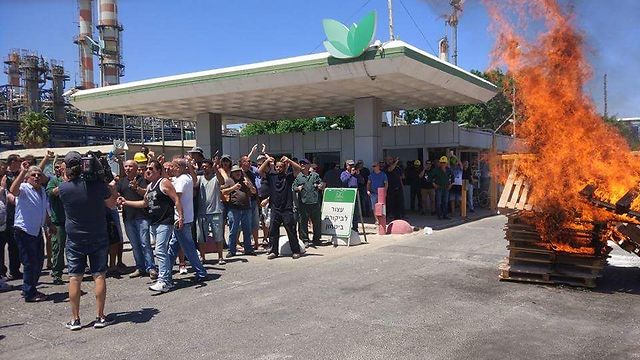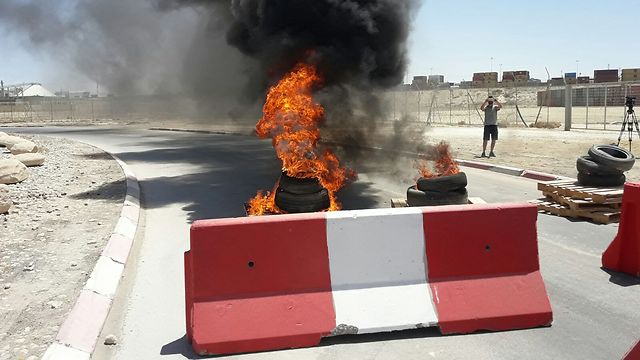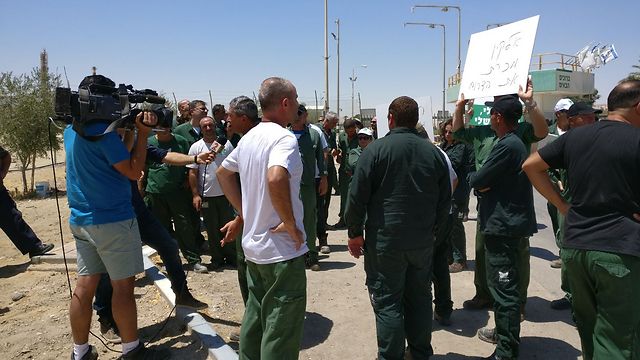
Protest
Photo: Histadrut
Workers from the Haifa Chemicals company erected a protest tent Wednesday evening both inside and outside its plant after it was announced earlier in the day that the company was closing shop and letting go of its 800 employees.
In addition to blocking off the roads near the plant, the enraged workers, fearing for their livelihoods, set tyres alight and waved placards calling on Minister of Environmental Protection Ze’ev Elkin (Likud), whom they consider primarily responsible for their plight, to immediately intervene and slam the breaks on the expected redundancies.
The announcement came after authorities failed to find a reasonable alternative to replace a large ammonia tank required by the company to function which was ordered to be shut down earlier this year.
The colossal, circular vat is located in the northern port of Haifa, Israel's third largest city, and can hold 12,000 tons of ammonia, which is used in products such as fertilizer and explosives.
Haifa Chemicals workers protest closure (צילום: שמיר אלבז)
An Israeli court in February ordered the company to shut down the ammonia tank—the largest in the country—which has been a point of contention for years, with residents and environmental groups warning it is a major health hazard.
"Haifa Chemicals management decided to close the company and is forced to fire all its employees," the company said in a statement.
The workers blocked off roads leading to the plant and the Histadrut has vowed to continue the protest until a solution is found to the crisis.
In addition to blocking off the roads near the plant, the enraged workers, fearing for their livelihoods, set tyres alight and waved placards calling on Minister of Environmental Protection Ze’ev Elkin (Likud), whom they consider primarily responsible for their plight, to immediately intervene and slam the breaks on the expected redundancies.
By Wednesday morning, dozens of Haifa Chemicals workers had assembled outside the plant’s premises, lighting fires and demanding the resignations of the company's CEO Nadav Shachar and Prime Minister Benjamin Netanyahu.
Chairman of the Southern Workers’ Committee Yehuda Peres slammed the closure, arguing that it constituted “the targeted destruction of the periphery.”
“We didn’t give up over the last five months and I don’t intend to give up now,” he stated defiantly. “Today, the struggle entered a new phase and anyone who wants to move us will have to do so by force.”
Vowing to keep the protest up at full throttle until a “real solution” had been found, Peres went on to say that the affair could not go on at the expense of the workers’ livelihoods and their children.
Aviram Elmakias, 28 from Dimona has particular cause to be concerned by the mass layoffs since he and his wife are expecting a baby in the near future. With Aviram being the sole breadwinner of the family, he explained why he is so overwhelmed by a sense of trepidation.
“The significance of losing work is hard. Yes, I am young but to have to go out and look for work when my wife may give birth any minute is difficult,” he said.
“We are in a state of total uncertainty and are disheartened by the situation. What happens in the factory seriously affects my home, and my wife is under serious stress. It isn’t nice to bring a child into the world this way. We don’t even know who to blame.”
With the closure, Eli Ben Hamo, 44 is another worker being placed under similar strain. Married with three children, Hamo has worked for the company for more than five years.
“It is awful when you know you need to get to your workplace to receive a notice that the factory is being closed. Yesterday we still had hope, we thought there would be positive results and that they had found a solution for us, but there’s nothing,” he lamented.
Unlike Elmakias however, Hamo knew who he was blaming for the crisis. “I think that if the minister of environmental protection is convinced and decides, it will be possible to find a solution. Everything is in his hands. We are for the closure of the ammonia tank, but there are alternatives. No one is taking responsibility.”




















